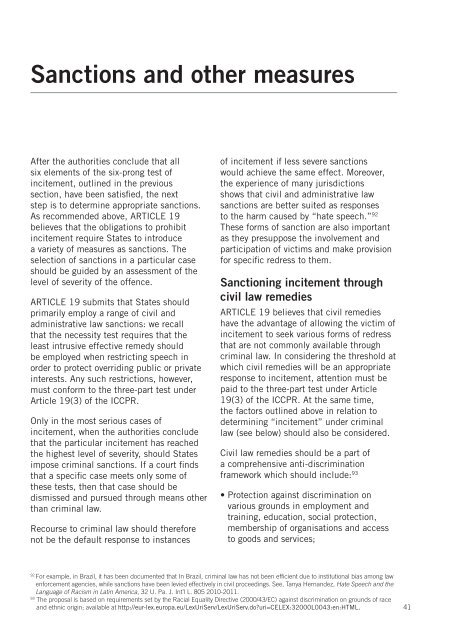ARTICLE-19-policy-on-prohibition-to-incitement
ARTICLE-19-policy-on-prohibition-to-incitement
ARTICLE-19-policy-on-prohibition-to-incitement
Create successful ePaper yourself
Turn your PDF publications into a flip-book with our unique Google optimized e-Paper software.
Sancti<strong>on</strong>s and other measures<br />
After the authorities c<strong>on</strong>clude that all<br />
six elements of the six-pr<strong>on</strong>g test of<br />
<strong>incitement</strong>, outlined in the previous<br />
secti<strong>on</strong>, have been satisfied, the next<br />
step is <strong>to</strong> determine appropriate sancti<strong>on</strong>s.<br />
As recommended above, <str<strong>on</strong>g>ARTICLE</str<strong>on</strong>g> <str<strong>on</strong>g>19</str<strong>on</strong>g><br />
believes that the obligati<strong>on</strong>s <strong>to</strong> prohibit<br />
<strong>incitement</strong> require States <strong>to</strong> introduce<br />
a variety of measures as sancti<strong>on</strong>s. The<br />
selecti<strong>on</strong> of sancti<strong>on</strong>s in a particular case<br />
should be guided by an assessment of the<br />
level of severity of the offence.<br />
<str<strong>on</strong>g>ARTICLE</str<strong>on</strong>g> <str<strong>on</strong>g>19</str<strong>on</strong>g> submits that States should<br />
primarily employ a range of civil and<br />
administrative law sancti<strong>on</strong>s: we recall<br />
that the necessity test requires that the<br />
least intrusive effective remedy should<br />
be employed when restricting speech in<br />
order <strong>to</strong> protect overriding public or private<br />
interests. Any such restricti<strong>on</strong>s, however,<br />
must c<strong>on</strong>form <strong>to</strong> the three-part test under<br />
Article <str<strong>on</strong>g>19</str<strong>on</strong>g>(3) of the ICCPR.<br />
Only in the most serious cases of<br />
<strong>incitement</strong>, when the authorities c<strong>on</strong>clude<br />
that the particular <strong>incitement</strong> has reached<br />
the highest level of severity, should States<br />
impose criminal sancti<strong>on</strong>s. If a court finds<br />
that a specific case meets <strong>on</strong>ly some of<br />
these tests, then that case should be<br />
dismissed and pursued through means other<br />
than criminal law.<br />
Recourse <strong>to</strong> criminal law should therefore<br />
not be the default resp<strong>on</strong>se <strong>to</strong> instances<br />
of <strong>incitement</strong> if less severe sancti<strong>on</strong>s<br />
would achieve the same effect. Moreover,<br />
the experience of many jurisdicti<strong>on</strong>s<br />
shows that civil and administrative law<br />
sancti<strong>on</strong>s are better suited as resp<strong>on</strong>ses<br />
<strong>to</strong> the harm caused by “hate speech.” 92<br />
These forms of sancti<strong>on</strong> are also important<br />
as they presuppose the involvement and<br />
participati<strong>on</strong> of victims and make provisi<strong>on</strong><br />
for specific redress <strong>to</strong> them.<br />
Sancti<strong>on</strong>ing <strong>incitement</strong> through<br />
civil law remedies<br />
<str<strong>on</strong>g>ARTICLE</str<strong>on</strong>g> <str<strong>on</strong>g>19</str<strong>on</strong>g> believes that civil remedies<br />
have the advantage of allowing the victim of<br />
<strong>incitement</strong> <strong>to</strong> seek various forms of redress<br />
that are not comm<strong>on</strong>ly available through<br />
criminal law. In c<strong>on</strong>sidering the threshold at<br />
which civil remedies will be an appropriate<br />
resp<strong>on</strong>se <strong>to</strong> <strong>incitement</strong>, attenti<strong>on</strong> must be<br />
paid <strong>to</strong> the three-part test under Article<br />
<str<strong>on</strong>g>19</str<strong>on</strong>g>(3) of the ICCPR. At the same time,<br />
the fac<strong>to</strong>rs outlined above in relati<strong>on</strong> <strong>to</strong><br />
determining “<strong>incitement</strong>” under criminal<br />
law (see below) should also be c<strong>on</strong>sidered.<br />
Civil law remedies should be a part of<br />
a comprehensive anti-discriminati<strong>on</strong><br />
framework which should include: 93<br />
• Protecti<strong>on</strong> against discriminati<strong>on</strong> <strong>on</strong><br />
various grounds in employment and<br />
training, educati<strong>on</strong>, social protecti<strong>on</strong>,<br />
membership of organisati<strong>on</strong>s and access<br />
<strong>to</strong> goods and services;<br />
92 <br />
For example, in Brazil, it has been documented that In Brazil, criminal law has not been efficient due <strong>to</strong> instituti<strong>on</strong>al bias am<strong>on</strong>g law<br />
enforcement agencies, while sancti<strong>on</strong>s have been levied effectively in civil proceedings. See, Tanya Hernandez, Hate Speech and the<br />
Language of Racism in Latin America, 32 U. Pa. J. Int’l L. 805 2010-2011.<br />
93<br />
The proposal is based <strong>on</strong> requirements set by the Racial Equality Directive (2000/43/EC) against discriminati<strong>on</strong> <strong>on</strong> grounds of race<br />
and ethnic origin; available at http://eur-lex.europa.eu/LexUriServ/LexUriServ.douri=CELEX:32000L0043:en:HTML.<br />
41


